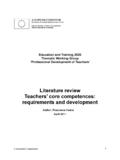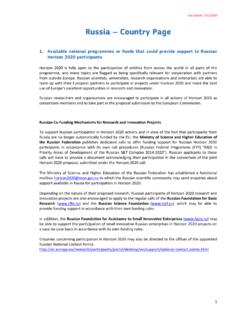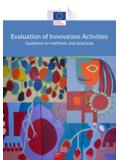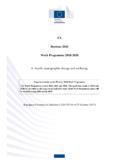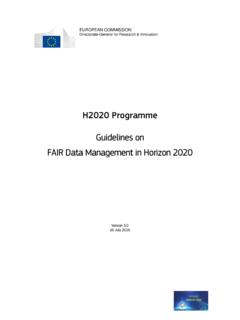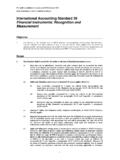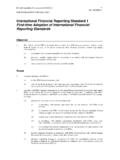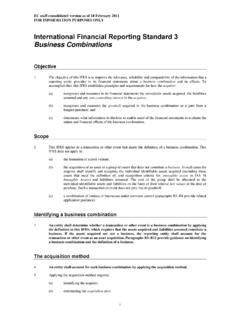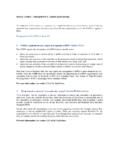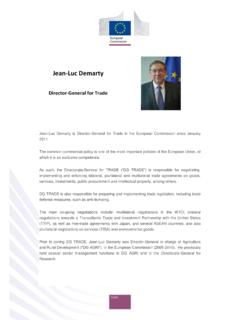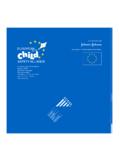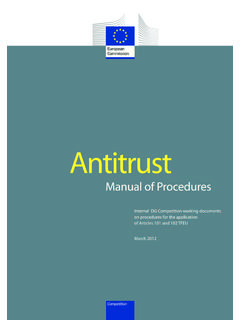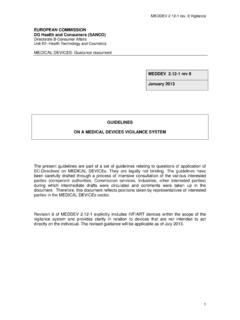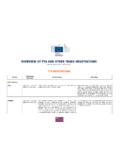Transcription of Zero-rating practices - European Commission
1 In broadband markets Zero-rating practicesReport byCompetition European Commission directorate - general for Competition E-mail: European Commission B-1049 Brussels [Catalogue number] Zero-rating practices in broadband markets Final report February 2017 LEGAL NOTICE The information and views set out in this report are those of the author(s) and do not necessarily reflect the official opinion of the Commission . The Commission does not guarantee the accuracy of the data included in this study. Neither the Commission nor any person acting on the Commission s behalf may be held responsible for the use which may be made of the information contained therein. Les informations et opinions exprim es dans ce rapport sont ceux de(s) l'auteur(s) et ne refl tent pas n cessairement l'opinion officielle de la Commission . La Commission ne garantit pas l exactitude des informations comprises dans ce rapport.
2 La Commission , ainsi que toute personne agissant pour le compte de celle-ci, ne saurait en aucun cas tre tenue responsable de l utilisation des informations contenues dans ce rapport. More information on the European Union is available on the Internet ( ). Luxembourg: Publications Office of the European Union, 2017 Catalogue number: KD-02-17-687-EN-N ISBN 978-92-79-69466-0 doi: European Union, 2017 Reproduction is authorised provided the source is acknowledged. Europe Direct is a service to help you find answers to your questions about the European Union. Freephone number (*): 00 800 6 7 8 9 10 11 (*) The information given is free, as are most calls (though some operators, phone boxes or hotels may charge you). Prepared by: DotEcon Ltd 17 Welbeck Street London W1G 9XJ Content Content 1 Introduction .. 1 2 Research into Zero-rating practices in Europe .. 5 Summary of results on current zero -rated offers.
3 8 Survey of regulators and competition authorities .. 21 3 Case studies .. 29 Bulgaria .. 30 Germany .. 42 Portugal .. 54 Sweden .. 68 United Kingdom .. 78 Non- European case study USA .. 89 4 Summary of key findings from our research ..103 Zero-rating in mobile markets ..103 Zero-rating in fixed markets ..105 5 Potential benefits and costs from Zero-rating ..107 Potential benefits from Zero-rating ..107 Potential harmful effects from Zero-rating ..113 Summary ..122 6 Framework for competition assessment ..123 Competition assessment must reflect the internet ecosystem ..125 Elements to be considered when assessing the potential impact on competition between ISPs ..128 Elements to be considered when assessing the potential impact on competition between Materiality of effects ..136 Summary ..138 Annex A Brief summaries of the reviewed literature ..139 Annex B National laws, regulation and case-law on Zero-rating .
4 172 Annex C References ..181 i Executive Summary Executive Summary Zero-rating the practice of excluding some traffic from overall data caps has received a considerable amount of attention in the debate about net neutrality. Applying different charges depending on the type of traffic may be considered as incompatible with the principle of treating all data the same, and therefore with the net neutrality principle. However, others have pointed out the potential benefits associated with Zero-rating , such as promoting broadband access and access to services through lowering costs and enabling product and price differentiation. European net neutrality rules permit Zero-rating (under certain conditions), and data plans including zero -rated offers are available in most Member States, mostly in the mobile market. In this report, we present the results of research undertaken on current and historic zero -rated offers in Europe, including a survey of national regulatory and competition authorities.
5 As Zero-rating is capable of affecting end users inter-related choices of internet service provider and the content they access, it can have an impact on competition between internet service providers (ISPs) and content and application providers (CAPs). Based on the findings from our research, and on a review of the economic and legal literature on Zero-rating , we also set out an initial framework for the competition assessment of Zero-rating practices . At the most basic level, Zero-rating will reduce the cost of accessing particular types of content via a particular ISP. Zero-rating affects the traffic-related cost of using a service. The effective discount offered by Zero-rating depends on the importance of traffic-related costs relative to the total cost faced by the user for accessing the content. It should be expected to affect: Zero-rating may affect choice of ISP and choice of content the decision whether or not to obtain access; the choice of access provider; and the choice of content and the amount of data consumption overall.
6 The impact on user choice depends on several factors, including consumer patterns and the magnitude of the effective discount relative to the difference in value the user places on different types of services. Though the actual impact that Zero-rating has on user choices, and the factors that determine the magnitude of any such effect, are crucial for an assessment of the costs and benefits of Zero-rating , there is little information about the strength of the different effects and their impact on market outcomes. ii Executive Summary iii Our research of Zero-rating in Europe shows that the practice tends to be much more prominent in the case of mobile than fixed broadband services. In fact, we are only aware of one zero -rated offer by a fixed operator across Europe BT Zero-rating its BT TV service in the UK. This is simply because most fixed broadband plans are uncapped, which means that all traffic is effectively zero -rated, whilst mobile broadband plans typically have data caps.
7 Zero-rating in mobile markets is becoming more prevalent across Europe as well as the USA. There was little Zero-rating prior to 2012, but it is now increasingly common, perhaps as a result of the greater clarity about permitted practices flowing from the Telecoms Single Market (TSM) regulations1 and the BEREC guidelines on the implementation of net neutrality The number of zero -rated offers varies significantly between European countries, and there does not appear to be any geographical or economic patterns in the use of Zero-rating . Evidence from our detailed case studies partially supports the hypothesis that Zero-rating should be more common in countries where data caps are tighter the case study countries with the lowest data caps, Portugal and Bulgaria, both have a large number of zero -rated tariffs. However, there are also exceptions, such as Sweden, where mobile plans have very high data allowances, but we still find instances of zero -rated offers.
8 The content categories that are most commonly zero -rated are social media, audio streaming, video streaming and communication (text). Data-light applications are more commonly zero -rated than data-intensive applications. In most content categories, there are more instances of Zero-rating of third-party content than of operator-owned content, though this may simply reflect that there are fewer operator-owned applications in these categories. The nature of the zero -rated offers differs dramatically between countries. In some countries, it is more common for mobile operators to zero -rate one or two specific services, such as Facebook ( in Bulgaria and Germany), whilst in others mobile operators tend to zero -rate a wide range of services within a category ( a group of audio streaming applications rather than 1 Regulation (EU) 2015/2120 of the European Parliament and of the Council of 25 November 2015 laying down measures concerning open internet access and amending Directive 2002/22/EC on universal service and users rights relating to electronic communications networks and services and Regulation (EU) No 531/2012 on roaming on public mobile communications networks within the Union, OJ L 310, 2 BEREC Guidelines on the Implementation by National Regulators of European Net Neutrality Rules, BoR (16))
9 127, August 2016 Zero-rating is more common in mobile markets, and is growing from an initially low level Social media, audio and video streaming are the applications most commonly zero -rated Zero-rating practices vary substantially across countries, showing no clear pattern Executive Summary iv only Spotify, as in Portugal and Sweden). In most countries, zero -rated offers are bundled with mobile tariffs; whilst in some countries ( Bulgaria) there are a large number of add-on zero -rated offers, where consumers can pay an additional fee for an incremental data allowance for particular applications. Mobile network operators (MNOs) practice Zero-rating much more frequently than mobile virtual network operators (MVNOs), and multi-state MNOs vary in their propensity to zero -rate across the EU. For example, Telef nica zero -rates in all three of its European markets, although its zero -rated offers are different in each country. In contrast Telia practices very little Zero-rating .
10 There appears to be little pattern in the extent to which major applications are zero -rated across markets. For example, Spotify is zero -rated in some of the case study countries but not others. Facebook-owned services are zero -rated in different combinations in different countries. For example in Germany only Facebook zero and WhatsApp are zero -rated, whereas in Sweden Facebook, Facebook Messenger, Instagram and WhatsApp are all zero -rated. This suggests that either CAPs have little influence over whether their applications are zero -rated and the decision is instead made by the ISPs, or that CAPs do not take a multi-country approach to the applications they wish to be zero -rated. In most but not all cases it is clear from the operator s website and/or terms and conditions whether an application is zero -rated. However, it is often not possible to ascertain what happens to the zero -rated application once a user exceeds the general data allowance ( whether the application continues to be zero -rated or is rated, throttled, blocked, etc.)
